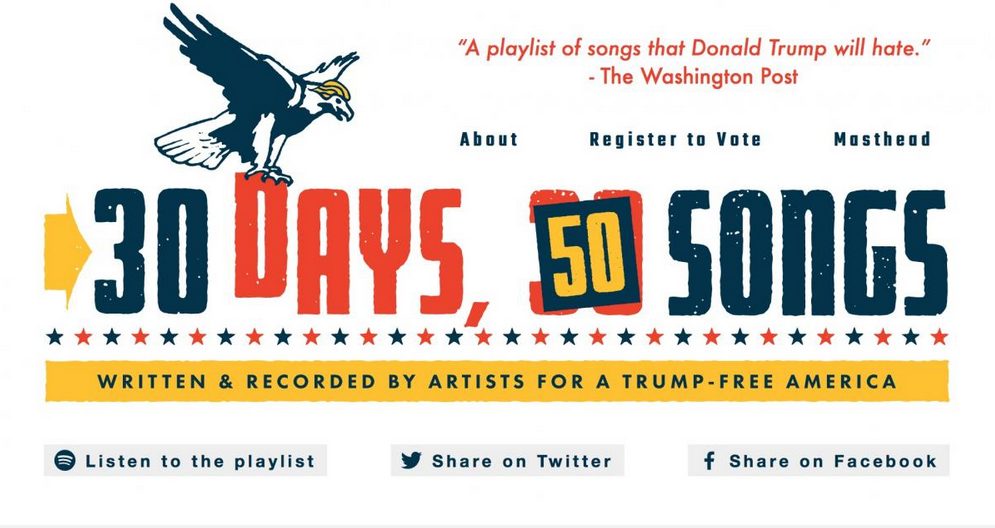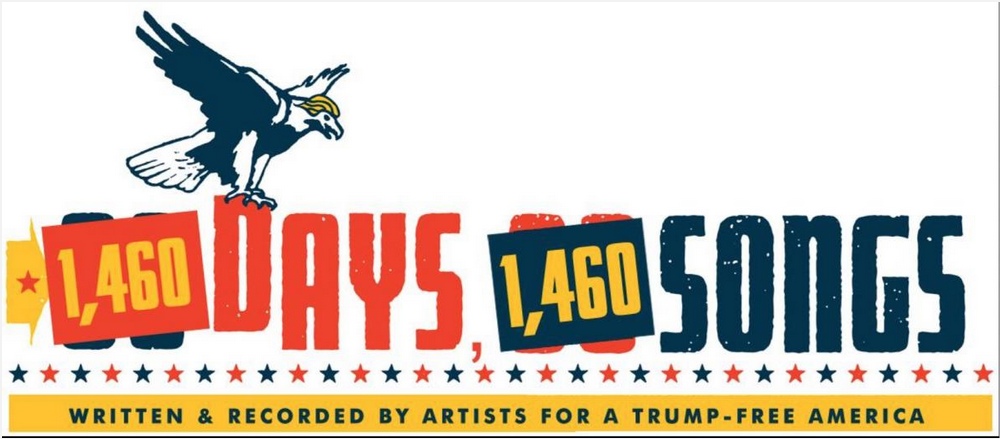December 19, 2016
Ryan Bañagale’s essay on the first seven songs of the 30 Days, 30 Songs website discussed the project’s beginnings.[i] Since then, more songs have been released. On October 24, organizers Dave Eggers and Jordan Kurland pointed out that they were expanding it to 30 days and 40 songs because so many more artists wanted to participate. They revealed in a Facebook post,
We are happy to announce that we are expanding this project to include 40 songs in 30 days. Since launching, we’ve received songs of protest from artists across the country. Like the artists we’ve already featured, these musicians want to speak out against the hateful, divisive campaign of Donald Trump.
On November 1, the project once again announced that there would be yet another 10 songs released, totaling 50 songs on the website (Fig. 1). The purpose of the project, as the “About” section of the website states, is as follows: “As artists, we are united in our desire to speak out against the ignorant, divisive, and hateful campaign of Donald Trump.” The reactions to the project by journalists, media authors, and the fans have been striking in how blunt and vocal they are: journalist Meredith Connelly, for example, says that the project gives a musical middle finger to Trump in how the lyrics of the songs denigrate him.[ii]

Eggers and Kurland have granted various interviews since the project began on October 10. According to Kurland, the purpose of the project was to rally young voters. He and Eggers did not assign the topics to the artists, but instead they “just wanted people to write something inspired by Trump and all the things he’s said and done.”[iii] In Vogue, Eggers pointed out that the target audience for the songs is the undecided voter.[iv] Favoring hyperbolic rhetoric, he referred to Trump as a “world-ending meteorite heading toward the United States.”[v]
The website invests each song with its own page, including not only the lyrics and the video—if one was made—but also the artist’s story about how he or she came up with the song and, in some cases, why people should not vote for Trump. Some of these artists, such as Death Cab for Cutie, Franz Ferdinand, and The Long Winters, came out of a long hiatus just to participate in the project (this was the latter’s first “release” in a decade). Forty-eight different artists released 49 of the songs, the exception being Moby, who recorded two different songs for the project on the same day, each performed with a choir.[vi] Most of the songs on the website are newly composed, though there are a few parody songs and cover songs.
Many of the songs overtly criticize Trump’s actions. Lila Downs’ newly composed mariachi song, “The Demagogue,” musically, but not textually, refers to Trump’s incendiary remarks directed toward Mexicans.[vii] By using mariachi music, the song indirectly references his desire to keep illegal immigrants from crossing the southern border (in fact, on the night of the election, a mariachi band paraded outside of Trump Tower). The lyrics to Franz Ferdinand’s newly composed song “Demagogue,” which was released a mere two days after the unveiling of an audio tape where Trump bragged about his sexually aggressive treatment of women to a television host, mentions his “pussy grabbing fingers.”[viii] The song is in the alternative rock style typical for the band’s releases. Cold War Kids were inspired to join the project with their newly composed track “Locker Room Talk” after hearing Death Cab for Cutie’s song.[ix] The first verse, as well as the title, is a direct reference to the tape and Trump’s response to it, in which he justified his sexually abusive comments as just “locker room talk.”
Just one day after Donald Trump’s star on the Hollywood Walk of Fame was destroyed, clipping. released their newly composed song, “Fat Fingers,” a hip hop track and accompanying video which featured video footage of the person destroying the star.[x] The song begins with sounds from a playground and ends with people whistling the Canadian National Anthem, perhaps a nod to Trump detractors’ claims that they will move to Canada in the event of a Trump win.
Two of the songs use a folk style typical of 1960s protest music. The first, “Old Man Trump,” is actually a newly composed song that sets a text that Woody Guthrie a wrote in the 1950s about his landlord, Trump’s father (Fred Trump).[xi] These lyrics were uncovered at the Woody Guthrie Archives.[xii] Guthrie’s estate gave U.S. Elevator (Mac McCaughan and Tim Bluhm) permission to cover the song specifically for this project, partially because U.S. Elevator’s front man, Johnny Irion, is married to Guthrie’s granddaughter.[xiii] While the lyrics are Guthrie’s, typical of the singer-songwriter’s style, the musical style is modern in that it is a modern alternative rock song but the band has its roots in folk music.[xiv] The second newly composed song, Andrew St. James’s “Makin’ It Great Again!,” is in the style of protest songs created by Bob Dylan, not only musically, but also in the way St. James sings (he seems to imitate Dylan’s voice) and how the recording was mastered.[xv] Like much of Dylan’s music, the song is in urban folk style and features the guitar and harmonica as prominent instruments, just as Dylan does in his music. And speaking of Bob Dylan, Wesley Stace’s parody song “Mr. Tangerine Man,” sung to the tune of Dylan’s “Mr. Tambourine Man,” berates Trump’s outwardly “orange” appearance and his out-of-control hair, then ridicules his sore-loser attitude and even makes fun of his children’s appearances.[xvi]
There are other covers as well. The fiftieth and final song, “Vote for Me Dummy,” performed by Rogue Wave, is a cover of the same song originally performed by Guided by Voices.[xvii] The newly composed song “Bart to the Future Part 2: The Musical” by Modern Baseball is inspired by the prescient March 19, 2000 episode of The Simpsons called “Bart to the Future,” a parody in title of the film Back to the Future, in which Trump becomes president (Fig. 2).[xviii]

Many of the songs use Trump’s rhetoric against him in their titles and/or lyrics, such as in St. James’s newly composed song “Makin’ It Great Again!” and The Long Winters’ newly composed song “Make America Great Again.”[xix] These two songs are linked topically by using the basic idea of Trump’s own words. Other songs address Trump’s relationship with Russian Prime Minister Vladimir Putin: thus the video for Baz Bhiman’s newly composed song “With Love From Russia,” a play on the title of the James Bond movie From Russia with Love (1963), features a still shot of a painted mural that shows both men embracing and kissing (Fig. 3).[xx]

Several of the songs take on a humorous or satirical tone in imagining a Trump presidency. For example, in a video collaboration with comedy video website Funny or Die, Loudon Wainwright III, father of singer-songwriter Rufus Wainwright, performs his newly composed song “I Had a Dream” about a Trump presidency.[xxi] He imagines who Trump would install in his cabinet, referring to a Trump presidency as a nightmare while at the same time citing the title of Martin Luther King’s iconic speech. Like St. James’s “Makin’ It Great Again,” this song is for solo acoustic guitar, harmonica, and voice in urban folk style. Tim Heidecker’s newly composed black humor song “Trump’s Pilot” is sung from the perspective of the person piloting Trump’s airplane, who takes the plane down to deter him from being elected.[xxii]
Two of the newly composed songs, Death Cab for Cutie’s “Million Dollar Loan” and Heidecker’s “Trump’s Pilot” received updates during the course of the election’s last days.[xxiii] On November 7, Death Cab released a new animated music video for “Million Dollar Loan” which, as of this writing, has almost 33,683 views on YouTube. Only a few hours after the release of “Trump’s Pilot,” Father John Misty released a cover of the song, showing how significant this song was to Misty.[xxiv]
The 30 Days, 30 Songs project is unusual in its representation of a wide range of genres. It is not as homogenous as musicians’ earlier anti-election projects, such as those against George W. Bush and John Kerry, which were mainly confined to a single genre. Here, there is a mix of every genre from Indie rock to spoken word to hip-hop to metal and everything in between.[xxv]
The project released its last two songs on Election Day. The final Facebook post of the day reminded people of their duty: “The first polls close at 6 p.m. EST. Get out there and #vote! Thank you to everyone who contributed to and supported this project. No matter what happens tonight, we will remain united against the ignorance and bigotry that has defined Donald Trump’s campaign.” The goal of the project, it seems, was to prevent the unthinkable from happening.
But the unthinkable did happen. Trump was elected to the presidency and, two days later, the project’s Facebook page featured a new cover photo that counts the days left in Trump’s presidency, phrasing it as 1460 Days, 1460 Songs, though no songs will actually be released (Fig. 4). The project’s creators voiced their resilience to not give up and this was accompanied by a simple caption: “Keep your heads up. Keep fighting.”

–
Reba Wissner
[i] Ryan Raul Bañagale, “30 Days, 30 Songs: ‘Puncturing That Inflated Horror of an Ego,” Trax on the Trail, October 17, 2016, http://traxonthetrail.com/article/30-days-30-songs-%E2%80%9Cpuncturing-inflated-horror-ego%E2%80%9D.
[ii] Meredith Connelly, “30 Days, 30 Songs Gives a Musical Middle Finger to Trump,” Noise Porn, October 22, 2016, http://www.noiseprn.com/2016/10/22/30-days-30-songs-gives-musical-middle-finger-trump/.
[iii] Alex Galbraith, “Meet the Man That Rallied Your Favorite Artists to Write Donald Trump Protest Songs,” Uproxx, October 19, 2016), http://uproxx.com/music/30-days-30-songs-donald-trump-interview/.
[iv] Julia Felsenthal, “Dave Eggers on 30 Days, 30 Songs, His Project for a Trump-Free America, Vogue, October 14, 2016), http://www.vogue.com/13492341/30-days-30-songs-dave-eggers-interview.
[v] Ibid.
[vi] Moby and the Homeland Choir, “Trump Is on Your Side,” 30 Days, 30 Songs, video clip, http://www.30days30songs.com/12; and Moby and the Void Pacific Choir, “Little Failure,” 30 Days, 30 Songs, video clip, http://www.30days30songs.com/13.
[vii] Lila Downs, “The Demagogue,” 30 Days, 30 Songs, video clip, http://www.30days30songs.com/14.
[viii] Franz Ferdinand, “Demagogue,” 30 Days, 30 Songs, video clip, http://www.30days30songs.com/5.
[ix] Cold War Kids, “Locker Room Talk,” 30 Days, 30 Songs, video clip, http://www.30days30songs.com/30.
[x] clipping., “Fat Fingers,” 30 Days, 30 Songs, video clip, http://www.30days30songs.com/25.
[xi] Michael Kennedy, “‘This Land is (Once Again) Your Land’: Woody Guthrie and the 2015-2016 US Presidential Race,” Trax on the Trail, August 24, 2016.
[xii] U.S. Elevator (feat. Mac McCaughan and Tim Bluhm), “Old Man Trump,” 30 Days, 30 Songs, video clip, http://www.30days30songs.com/15.
[xiii] Ibid.
[xiv] U.S. Elevator, “About,” August 29, 2015), http://www.uselevator.net/about/.
[xv] Andrew St. James, “Makin’ It Great Again!,” 30 Days, 30 Songs, video clip, http://www.30days30songs.com/20.
[xvi] Welsey Stace, “Mr. Tangerine Man,” 30 Days, 30 Songs, video clip, http://www.30days30songs.com/28; and ZeDesXia, “Bob Dylan – Mr. Tambourine Man,” September 17, 2016, YouTube, video clip, https://www.youtube.com/watch?v=pMc8jcvTZdQ.
[xvii] Rogue Wave, “Vote for Me Dummy,” 30 Days, 30 Songs, video clip, http://www.30days30songs.com/50; and Guided By Voices, “Vote for Me Dummy,” February 8, 2014, YouTube, video clip, https://www.youtube.com/watch?v=yYtP8XhBu2A.
[xviii] Back to the Future, directed by Robert Zemeckis, 1985; and Modern Baseball, “Bart to the Future Part 2: The Musical,” 30 Days, 30 Songs, video clip, http://www.30days30songs.com/46.
[xix] The Long Winters, “Make America Great Again,” 30 Days, 30 Songs, video clip, http://www.30days30songs.com/36.
[xx] Baz Bhiman, “With Love From Russia,” 30 Days, 30 Songs, video clip, http://www.30days30songs.com/3.
[xxi] Loudon Wainwright III, “I Had a Dream,” 30 Days, 30 Songs, video clip, http://www.30days30songs.com/29.
[xxii] Tim Heidecker, “Trump’s Pilot,” 30 Days, 30 Songs, video clip, http://www.30days30songs.com/45.
[xxiii] Death Cab for Cutie, “Million Dollar Loan,” 30 Days, 30 Songs, video clip, http://www.30days30songs.com/1.
[xxiv] Death Cab for Cutie, “Death Cab for Cutie – ‘Million Dollar Loan,’” November 7, 2016, YouTube, video clip, https://www.youtube.com/watch?v=irM1pm-UZLM; and I live in the woods. My intentions are good, “Father John Misty – ‘Trump’s Pilot,’” November 7, 2016, YouTube, video clip, https://www.youtube.com/watch?v=bkzvgEQtmkE.
[xxv] Reba Wissner, “Not Another Term: Music as Persuasion in the Campaign Against the Re-Election of George W. Bush,” Trax on the Trail, October 5, 2016.
